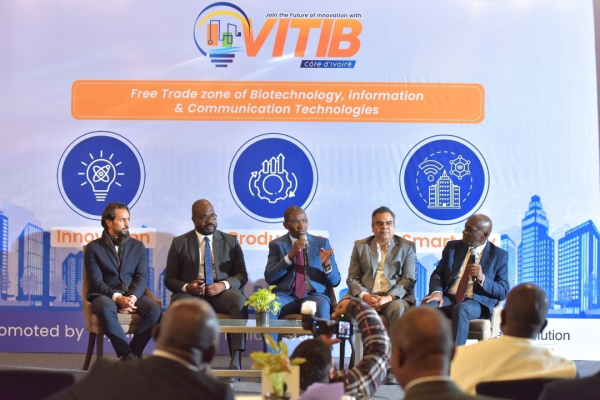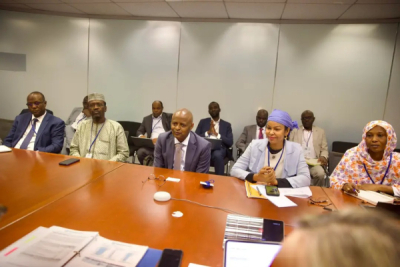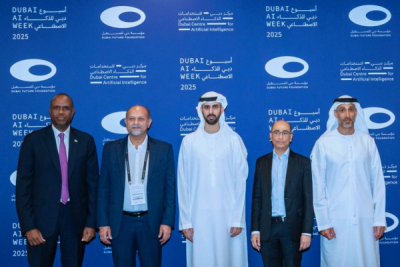Since its inception in 2004, VITIB has aimed to position Ivory Coast as a key player in technological innovation. Now, it's intensifying efforts to attract strategic investments and evolve into a leading technology hub in West Africa.
The Information Technology and Biotechnology Village (VITIB), situated in Grand-Bassam, Côte d’Ivoire, is intensifying its drive to secure $311 million (180 billion CFA francs) to fund its development blueprint through 2028. The initiative aims to transform its special economic zone into a comprehensive technology hub, spurring innovation and economic expansion across West Africa.
To this end, a VITIB delegation recently travelled to India for discussions with investors and prospective collaborators. Conversations focused on investment prospects within the park, infrastructure development, modalities for industrial and financial alliances, and the incorporation of cutting-edge technological solutions. Among the entities engaged were AXL, OKAYA Group, and representatives from the Export-Import Bank of India.
"India occupies a significant chapter in VITIB's history. Shortly after its inception, Côte d’Ivoire’s first technology park benefited from crucial financial backing through a loan from Exim Bank of India, which facilitated the construction of essential infrastructure. As a tribute to this partnership, a section of the technology park was named after Mahatma Gandhi," VITIB stated.
Spanning more than 600 hectares, VITIB is organized into three distinct zones: manufacturing, administrative, and residential. It is home to pioneering enterprises in the fields of information technology and biotechnology. It provides a favorable tax climate, featuring a five-year tax holiday followed by a lowered rate, alongside contemporary infrastructure such as data centers, fiber-optic connectivity, and a single-window service streamlining business establishment.
Its strategic roadmap aims to generate 40,000 skilled employment opportunities and attract $1.6 billion (1,000 billion CFA francs) in foreign direct investment. VITIB thereby aspires to establish Côte d’Ivoire as West Africa’s technological vanguard by cultivating an environment that fosters innovation and competitiveness.
This promotional tour in India forms part of a wider campaign to raise the profile of the technology park, draw new participants from the technology and biotechnology sectors, and investigate novel financing avenues. Leveraging its established relationship with India, VITIB seeks to inject fresh impetus into its project and solidify Grand-Bassam's position as a pivotal innovation hub in Africa.
By Samira Njoya,
Editing by Sèna D. B. de Sodji
Dans un contexte où la méconnaissance du droit freine souvent l’accès à la justice, cette solution numérique se veut un pont entre les citoyens et le système judiciaire, offrant des contenus fiables, accessibles et actualisés. Elle se positionne comme un outil d’inclusion juridique.
Beninese authorities unveiled a mobile application, dubbed "Justice.bj," designed to ease access to justice services this week. The initiative aims to simplify administrative processes and bolster the availability of legal information for citizens.
The application is now available for download on both iOS and Android platforms. According to the Google Play Store, it has already garnered over a thousand downloads. "Justice.bj" offers a range of features, including a comprehensive legal database encompassing laws, decrees, codes, and procedures currently in effect in Benin. Users can also access a directory of the nation's courts and find practical guidance on various administrative and judicial procedures. Notably, the app incorporates a scanning tool that allows users to verify the authenticity of official documents through QR codes.
"Justice.bj" is intended for a broad audience, including the general public, legal professionals, law students, and those working within the justice sector. Its interface allows users to consult legal codes, understand their rights, and identify the appropriate court for a legal matter without immediate external assistance. The application also prioritizes legal education for the public by providing explanatory articles that aim to demystify legal terminology.
However, the effectiveness of the application hinges on the regular updating of its legal texts and guides. Failure to do so could lead to the dissemination of outdated or inaccurate information. Furthermore, while efforts have been made to simplify legal language, the inherent technical nature of law means that some content may still prove challenging for individuals without legal training, potentially limiting their independent understanding of their rights.
Moreover, while "Justice.bj" seeks to democratize access to the law, its utility is contingent upon owning a smartphone and having internet connectivity. This could exclude a segment of the Beninese population, particularly those in rural areas or older individuals. DataReportal figures indicate that at the beginning of 2025, Benin had 4.71 million internet users, representing an internet penetration rate of 32.2%.
By Adoni Conrad Quenum,
Editing by Feriol Bewa
- RASCOM and Egypt’s Nilesat sign MoU to boost Africa’s space sector
- Agreement signed April 23 aims to enhance satellite capacity use, training, and innovation
- Parties to collaborate on infrastructure, platforms, and marketing of satellite services
- A dedicated marketing services contract was also concluded alongside the MoU
The Regional African Satellite Communications Organization (RASCOM) signed a memorandum of understanding on Wednesday, April 23, with Nilesat, the Egyptian national satellite operator. The two parties thus demonstrate their willingness to collaborate further to accelerate the development of the African space sector.
The main areas of collaboration focus on the commercialization of satellite capacities, training, innovation, and research. Both parties commit to pooling their expertise, platforms, applications, and satellite infrastructures. A marketing services contract was also concluded between them.
“This partnership marks a strategic convergence of our common objectives: to stimulate innovation, promote knowledge sharing, and advance satellite services in the region. Together, we aim to provide enhanced connectivity and promote skills development in the space sector,” said Hesham Lotfy Sallam, Commercial Director at Nilesat.
The establishment of this partnership comes shortly after the launch of the African Space Agency (AfSA), intended to structure the continent’s space initiatives. The agency is dedicated to the collection, analysis, and sharing of spatial data, in service of the continent’s sustainable development. This cooperative dynamic illustrates the growing momentum of the African space sector, with a multiplication of national initiatives. Last March, Botswana launched BOTSAT-1, its first satellite. Seventeen other countries on the continent have also already put satellites into orbit. Egypt leads the list with 14 spacecraft, followed by South Africa (13) and Nigeria (7).
Africa seeks to strengthen its position in the global space market, whose growth is accelerating. According to data recently cited by the Senegalese government, the global market is expected to exceed 737 billion dollars in the next decade. Space in Africa indicates that the value of the African market was estimated at 22.6 billion dollars in 2024.
Beyond these economic prospects, space technologies offer strategic advances in precision agriculture, natural resource management, environmental monitoring, and telecommunications. For this latter area, the Global System for Mobile Communications Association (GSMA) estimates that satellites have the potential to provide universal coverage in Africa, where a large part of the population is still deprived of mobile phone and Internet services.
Isaac K. Kassouwi
- State Minister Nguilin met World Bank officials in Washington on April 24
- Discussions focused on overhauling public services, e-learning, and civil registry digitization
- World Bank signaled readiness to expand support beyond e-procurement to full-service digital platforms
Chad is accelerating its digital transformation efforts and is counting on enhanced support from the World Bank to modernize its public services. On the sidelines of the Spring Meetings in Washington, State Minister Tahir Hamid Nguilin met on Thursday, April 24, with Michel Rogy, the World Bank’s Regional Director for Digital Development, and Jana Kunicova, Sector Director for West and Central Africa, to discuss the way forward.
During the meeting, the Chadian official stressed the urgent need to overhaul financial administrations, improve connectivity, and leverage digital technologies to make government services more accessible, efficient, and transparent. The government has identified key priorities, including the digitization of civil registry records, the digital transformation of school curricula, the expansion of e-learning, and the promotion of local innovation.
These goals are part of the Digital Transformation Support Project, already funded by the World Bank. Launched six months ago, the project has reached a disbursement rate of 8%, which the institution has welcomed as a promising sign. The World Bank reiterated its willingness to go beyond e-procurement support by helping establish an integrated digital platform for public services.
Still, accelerating progress will require substantial technical assistance. Chad faces several hurdles: patchy internet connectivity, a shortage of digital skills, and fragile infrastructure. Enhanced backing from the World Bank could help foster a structured, inclusive, and sustainable digital ecosystem—one designed to improve access to public services and strengthen governance.
According to the ICT Development Index 2024 published by the International Telecommunication Union, only 12.2% of Chadians currently have internet access. The country faces a stark digital divide between urban and rural areas. Additionally, Chad scores just 0.1194 out of 1 on the digital infrastructure development index—one of the lowest ratings globally. Against this backdrop, the World Bank’s support could play a critical role in building a coherent and resilient digital ecosystem that serves citizens and enhances effective governance.
By Samira Njoya,
Editing by Sèna D. B. de Sodji
In Nigeria, where accessing healthcare presents a significant hurdle, the platform DoktorConnect is leveraging technology to revolutionize the system. Its goals include reducing patient wait times at hospitals and alleviating the strain on often-overcrowded public health facilities.
DoktorConnect, a Nigerian-developed e-health solution, enables users to consult certified doctors via smartphone through messaging, voice, or video calls. The startup, with bases in Ikeja, Nigeria, and El Paso, United States, was founded in 2020 and has been led by Joseph Olowe since February 2021.
We "benchmarks your genomics against your wellness result to design an evidence-based lifestyle management plan for you. A digital platform that facilitates consultations with licensed doctors, both virtually and in person, using smart medical IoT devices for real-time vital signs tracking and remote patient monitoring," the healthtech says.
Its solution features a mobile application available on iOS and Android, where it has been downloaded over 10,000 times, according to the Google Play Store. Users create an account to access services ranging from medical teleconsultations to prescription delivery, including patient records monitoring.
The app also provides access to specialists such as gynecologists, pediatricians, and cardiologists, along with mental health counseling and personalized chronic disease management. Additional features include the ability to receive electronic prescriptions, access reliable medical information, and schedule medication reminders.
DoktorConnect aims to broaden healthcare access, particularly in urban and semi-urban areas. The platform operates on either a subscription or a pay-per-consultation basis. As part of Africa's expanding healthtech sector, DoktorConnect exemplifies how innovation can address critical needs in a region where challenges related to access, cost, and quality of care are widespread.
By Adoni Conrad Quenum,
Editing by Feriol Bewa
- Rwanda signed a trilateral memorandum of understanding with C4IR UAE and C4IR Malaysia during Dubai AI Week 2025.
- The partnership focuses on ethical, inclusive, and sustainable approaches to AI development.
- Key areas include governance frameworks, skills development, and technological innovation.
On Wednesday, April 23, during Dubai AI Week 2025, Rwanda inked a three-way memorandum of understanding with the Centres for the Fourth Industrial Revolution (C4IR) of the United Arab Emirates and Malaysia. Ambassador John Mirenge, representing the Rwandan government, finalized the agreement, signaling a significant stride in international collaboration on artificial intelligence.
This partnership aims to build on the momentum generated by Rwanda's AI fellowship program and foster deeper collaboration among the three nations. It will support joint efforts in areas such as governance frameworks, skills development, and technological innovation, with a focus on ethical, inclusive, and sustainable methodologies.
The agreement comes after Kigali hosted the inaugural Global Summit on Artificial Intelligence in Africa. That event, which convened experts, government officials, and private sector partners, underscored Rwanda's aspirations in AI and its increasing prominence in global discussions concerning technology governance.
Since 2022, Rwanda has operated its own Centre for the Fourth Industrial Revolution, established in partnership with the World Economic Forum. This center spearheads AI projects and develops appropriate regulatory structures. An ambitious initiative to create 50 artificial intelligence applications over four years was launched this month, aiming to accelerate the digital transformation of key sectors including healthcare, education, agriculture, finance, and public administration. This program aligns with the national digital development strategy and the country's Vision 2050.
This closer relationship could also enable Rwanda to leverage the advanced experience of the United Arab Emirates, which has already integrated AI into numerous government services, and Malaysia’s expertise in applying technological innovation to industry. For Kigali, this represents a strategic opportunity to expedite the growth of its own artificial intelligence ecosystem while solidifying its standing on the global technology stage.
By Samira Njoya,
Editing by Sèna D. B. de Sodji
- Morocco announced an international call for tenders to digitize the national civil registry.
- The digitization effort covers more than 38 million records across 1,821 civil registry offices.
- Phase one involves converting ~27 million paper documents (some dating to 1915) via manual entry and verification.
- Phase two targets ~11 million already-digitized records for auditing, indexing, and securing.
Morocco is launching an international call for tenders to select service providers for a national civil registry digitization project, the Directorate General of Local Authorities announced. The initiative, with a budget exceeding 194 million dirhams, or roughly $20.8 million, aims to overhaul the management of civil registry records and bolster the digitization of public services nationwide. Bids will be opened on May 29 at the Ministry of the Interior in Rabat.
"This project aims to establish a centralized and secure database, connecting all civil registry offices to a unified, high-performance information system," the Interior Ministry stated. "This will enable real-time data exchange with other public institutions, accelerating procedures, improving service quality, and strengthening the digital transformation of Moroccan administration."
The digitization effort will encompass over 38 million records spread across 1,821 civil registry offices throughout the country. It will proceed in two phases. The initial phase involves approximately 27 million paper documents, some dating back to 1915. These documents will undergo meticulous digitization, manual data entry, and rigorous verification to ensure data accuracy. The second phase will cover more than 11 million already-digitized documents, which will be audited, indexed, and secured to guarantee their integrity and traceability.
Selected service providers will be required to adhere to stringent cybersecurity standards and ensure the faithful preservation of the original documents. Payment for services will be phased, allowing for close monitoring of contractual obligations.
The project also includes the development of an integrated information system designed to centralize data while ensuring its seamless connection with other public services. This system will streamline administrative processes, reduce processing times, and ensure consistent service quality across the country.
Furthermore, an electronic portal will be created for citizens, enabling them to conduct various procedures remotely, including requests for birth certificates, family record books, and the registration of births and deaths. This portal is intended to enhance digital inclusion while alleviating pressure on physical administrative counters.
This project aligns with Morocco's national "Digital Morocco 2030" strategy, spearheaded by the Ministry of Digital Transition and Administrative Reform. Through this initiative, the Kingdom seeks to solidify its ambition to become a leading regional player in the digital sphere, leveraging technological innovation to serve its citizens and modernize public administration. The country has already made strides in this direction, digitizing 600 public services, including 300 for citizens, 200 for businesses, and 100 for government agencies.
By Samira Njoya,
Editing by Sèna D. B. de Sodji
Nigeria will host the AfCFTA Hackathon 2025, which will take place at the Landmark Event Centre in Lagos, from May 1–3, 2025. The event will bring together developers, entrepreneurs, and innovators from across Africa to build tech solutions for the continent’s digital trade challenges.
Themed “Empowering Youth for Africa’s Future Trade,” the event aims to drive innovation in areas such as e-commerce, digital payments, logistics, and digital identity. Participants will work on ideas that enhance cross-border trade under the African Continental Free Trade Area (AfCFTA).
The hackathon supports AfCFTA’s broader goals of economic integration and trade facilitation, with winning ideas potentially piloted for real-world application.
Tanmeyah, a subsidiary of EFG Holding and a leader in microfinance, has partnered with AMAN Holding, the fintech arm of Raya Holding, to enhance digital financial services for customers across Egypt.
The agreement, announced April 22, will allow Tanmeyah customers to receive financing and make payments digitally, including through AMAN’s retail network, available seven days a week, removing the need for branch visits or limited service hours.
The partnership will advance Egypt’s digital transformation and financial inclusion agenda by offering simplified, tech-enabled solutions to individuals and microenterprises.
Global leaders from government, industry, academia, and civil society will gather in Geneva from 7 to 11 July for the World Summit on the Information Society (WSIS)+20 High-Level Event 2025. The WSIS Forum coordinates action on using digital technologies for development.
Hosted by the International Telecommunication Union (ITU) and the Swiss Confederation, the event is co-organized with UNESCO, UNDP, UNCTAD, and over 40 UN partners. It will be held at the Palexpo center alongside the AI for Good Global Summit 2025.
This year’s event will review progress, explore challenges like AI, and help shape the WSIS agenda beyond 2025, ahead of a formal UN General Assembly review in September. It will highlight emerging tech trends and foster global cooperation on digital transformation.
More...
The UNICEF StartUp Lab is accepting applications for its next cohort of startups. This six-month accelerator supports innovative solutions tackling key development challenges in health, education, WASH (Water, Sanitation and Hygiene), climate action, child protection, finance, agriculture, and emerging digital technologies.
The program provides startups with up to GHS 75,000 in prototyping funds and scale-up grants of GHS 150,000 each for three standout ventures. Startups will also gain access to mentorship from UNICEF program experts and connections to its global network of country offices and partners.
To be eligible, startups must be registered and operational in Ghana for at least one year, with technology as a core component of their business model. Solutions must address at least one Sustainable Development Goal (SDG).
The reform represents a significant stride towards achieving equitable, accessible, and quality healthcare for all Kenyans, leveraging digital innovations to overcome longstanding challenges in the health sector.
On April 22, Cabinet Secretary for Health Aden Duale held a consultative meeting with the National Assembly Committee on Delegated Legislation, chaired by Hon. Samuel Chepkonga (MP, Ainabkoi), at Bunge Towers, Nairobi. The session focused on reviewing the Digital Health (Health Information Management Procedures) Regulations, 2025, ensuring they align with earlier parliamentary recommendations and effectively support the rollout of Universal Health Coverage (UHC).
During the meeting, CS Duale announced the operationalization of USSD code *147#, now in use to help Kenyans transition from the National Health Insurance Fund (NHIF) to the Social Health Authority (SHA)—a major milestone in Kenya’s ongoing healthcare reforms. The discussions also emphasized the need for robust public awareness campaigns, particularly at the grassroots level, to increase understanding and uptake of SHA services.
Kenya’s journey toward UHC has been a long-standing national priority. The NHIF, established in 1966, served as the country’s primary public health insurer for more than five decades. However, persistent challenges, such as limited coverage among informal sector workers and operational inefficiencies, prompted comprehensive reforms. These efforts culminated in the creation of the SHA in 2023, designed to provide more inclusive and sustainable health financing.
To further support this transformation, Kenya enacted the Digital Health Act in October 2023, laying the legal foundation for the safe and effective use of technology in healthcare. The Act enhances data privacy and security while establishing standards for digital health services such as telemedicine and mobile health platforms.
Through the revision of digital health regulations and the integration of user-friendly access channels like the USSD platform, Kenya is building a more accessible, affordable, and efficient healthcare system—one that is digitally empowered and truly inclusive.
Hikmatu Bilali
- Augustin Kibassa Maliba began an official visit on April 22 to strengthen digital ties with Tunisia
- Key meetings include sessions with Tunisia’s Ministry of Communication Technologies, ICT Federation (UTICA), and the African Business Council (TABC)
- Discussions center on digital transformation, postal modernization, and entrepreneurship collaboration
Congolese Minister of Posts, Telecommunications and Digital, Augustin Kibassa Maliba, began an official visit to Tunis on Tuesday, April 22, as part of an ambitious initiative to bolster bilateral digital cooperation between the Democratic Republic of Congo and Tunisia.
During his stay, Minister Kibassa Maliba is scheduled for several key meetings, including a bilateral ministerial session at the Tunisian Ministry of Communication Technologies. He will also attend a presentation on the Ecom@Africa platform and postal services, and engage in discussions with the Tunisian ICT Federation (UTICA) and the Tunisian African Business Council (TABC).
The visit includes an immersive experience within the Smart Tunisian Technoparks (S2T) ecosystem, recognized for its programs supporting entrepreneurship and innovation, its research and training initiatives, as well as its internationalization strategies and networking of technological ecosystems.
A central focus of the discussions will be the proposed creation of a Technopark in Kinshasa, with the aim that exchanges with Tunisian digital stakeholders will lay the groundwork for enhanced technical collaboration. This mission aligns with a broader strategy by the Congolese government to structure an effective digital ecosystem, support local tech entrepreneurship, and connect the DRC to regional innovation hubs.
Tunisia has established itself as a significant technological player in Africa. According to the International Telecommunication Union’s (ITU) “Measuring Digital Development – Facts and Figures 2024” report, 92.8% of the Tunisian population uses the internet, a figure considerably higher than the global average of 70.5%. The country’s ICT Development Index (IDI) score is 77.2 out of 100, reflecting continuous progress.
In e-governance, the United Nations’ “UN E-Government Survey 2024: The Future of Digital Government” ranks Tunisia 87th globally (EGDI score: 0.6935), placing it third in Africa behind South Africa (0.8616) and Mauritius (0.7506).
Should these partnerships materialize, the DRC stands to gain from Tunisia’s expertise in digital governance, modernization of postal services, development of technological ecosystems, and support for entrepreneurial innovation. This collaboration would facilitate the transfer of skills in strategic sectors and expedite the digitization of postal services. It would also foster the implementation of joint projects, the sharing of best practices in integrating online public services, and the enhancement of the Congolese ecosystem’s connection to African digital and logistics networks.
By Samira Njoya,
Editing by Sèna D. B. de Sodji
- Algeria inaugurates rapid prototyping platform at Ouzera University
- The platform supports students with innovative projects, aligning with the national strategy to build a knowledge economy
- It features advanced tools including 3D printing, laser cutting, and modeling equipment
Algeria's Minister of Higher Education and Scientific Research, Kamel Baddari (photo, center), inaugurated a rapid prototyping platform at the University of Ouzera in Médéa province on Tuesday, April 22, aiming to empower students with innovative projects. The facility aligns with the national strategy to position universities as key drivers of the knowledge economy.
"The launch of this technological rapid prototyping platform enhances the outcomes of scientific research, provides students with an avenue to establish startups, and reinforces the strategic role of students in wealth generation and the advancement of the knowledge and innovation economy," Minister Baddari said during the inauguration ceremony.
Equipped with sophisticated modeling tools, laser cutting, and 3D printing capabilities, the platform expedites the design and production of functional prototypes. This offers project developers the chance to realize their concepts more swiftly while lowering manufacturing expenses. It bolsters a growing technological ecosystem within Algerian universities, following the recent introduction of a national cloud computing platform, a drone design and control system, and a university incubator focused on entrepreneurship and innovation.
This initiative is part of a broader push to support the entrepreneurial landscape in Algeria. In recent years, the government has expanded support mechanisms for young project holders through the establishment of support structures such as the National Agency for the Promotion of Incubators (ANPI), startup development centers across various regions, and funding mechanisms like the Algerian Startup Fund, which has been allocated several billion dinars.
Currently, Algeria has several hundred officially registered startups operating in crucial sectors including digital technology, fintech, healthcare, and smart agriculture. The development of technological platforms within universities, such as the one in Ouzera, further strengthens an environment conducive to the emergence of a generation of innovators capable of actively contributing to the country's economic diversification.
By Samira Njoya,
Editing by Sèna D. B. de Sodji















